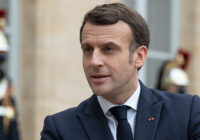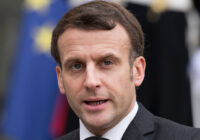Jean-Luc Mélenchon’s transformation since the 2012 election makes him a more appealing candidate.
For the past two weeks, France’s dramatic election campaign has been shaken by the surge in the polls of left-wing candidate Jean-Luc Mélenchon. The election, which until recently had looked like a runoff between the National Front leader Marine Le Pen and the centrist Emmanuel Macron or the conservative François Fillon, has turned into an uncertain four-man contest.
A poll published on April 10 by Le Figaro has placed Mélenchon at 18% in the first round, ahead of the initial favorite Fillon, whose campaign has been marred by allegations that he paid his wife and children close to €1 million in fake parliamentary jobs. Four candidates now have a serious chance of qualifying for the second round. Less than a week before the French go to the polls, the outcome of the vote looks more unpredictable than in any election in over 50 years amid indications that close to one-third of voters are still undecided.
A Hard-Left Firebrand
A hard-left firebrand known for his distrust of the media and abrasive style, Mélenchon left the Socialist Party in 2008 to create his own political movement, Le Parti de Gauche (Party of the Left), and ran for office for the first time in 2012. That the candidate has gone from political agitator to serious contender five years later is a clear sign that the national mood is shifting. Both right and left populist candidates have emerged as the strong voices in the French election campaign, tapping into the electorate’s distrust of elites and the political old guard.
The socialist primaries in January gave a foretaste of the country’s desire for change, when the left-leaning Benoit Hamon defeated Prime Minister Emmanuel Valls, whose candidacy was too closely associated with the unpopular government of President François Hollande. The anti-system rhetoric embraced by the front-runners (Fillon aside) is playing in Mélenchon’s favor. While Le Pen has declared herself an enemy of “the establishment,” the leftist candidate is appealing to the country’s angry and disillusioned (the “Unbent France,” as his campaign slogan proclaims) and has an established track record as an outsider to France’s main political parties.
Mélenchon’s well-structured campaign has been aided by the complete overhaul of his communication strategy. From the use of holograms in rallies to the launch of a video game allowing players to wrestle down Wall Street bankers, the candidate’s young communications team has infused a new dynamic to his campaign.
A seasoned orator who quotes French historical figures and poetry in his rallies, Mélenchon has also outperformed his rivals in the two televised debates in the run-up to the vote.
While the candidate has modernized his campaign, he could also appear, perhaps paradoxically, as a more reassuring option to voters than five years ago. In 2012, Mélenchon vowed to be “the sound and the fury” of the presidential campaign; his campaign rallies drew large crowds wearing bonnets rouges — red Phrygian-style caps associated with the popular uprising of the French Revolution.
Five years later, Mélenchon has toned down the symbolism without changing the substance of his program, which includes 90% taxation on high earnings and the renegotiation of European Union treaties. Calls to civil insurrections have, however, been replaced by the more consensus-building theme of resistance and international solidarity, while the red background on the candidate’s 2012 campaign posters has given way to a more neutral blue, reminiscent of former socialist President François Mitterand’s 1981 reassuring campaign slogan “La Force Tranquille” (The Quiet Force). Mélenchon has jettisoned some of the most controversial aspects of his political persona in an attempt to reassure and inspire confidence.
Second-Round Wildcard?
With polls suggesting that the election will be a close call, Mélenchon’s qualification for the second round has become a plausible scenario. The Le Figaro poll has put Le Pen and Macron at 24%, Mélenchon at 18% (up from 10% in March), Fillon at 17% and the socialist Hamon at 10%. Voter loyalties have shifted throughout the campaign as a result of political scandals, distrust of traditional parties and skepticism about pollsters’ predictions. The conservative primaries already defied predictions with the victory of Fillon against conservative veteran Alain Juppé.
Mélenchon’s camp looks emboldened in the last days of the campaign as Fillon, Le Pen and Macron’s voting bases appeared to have reached their ceiling. Fillon implicitly acknowledged his weakened position by telling his supporters in Paris on April 9: “I’m not asking you to love me. I’m asking you to support me because it is in France’s interest.”
Macron’s campaign has gained momentum in the past few weeks, but his lack of experience in TV debates has been reflected in his stagnation in the polls. Although Le Pen is still expected to win the first round, her recent involvement in controversy about France’s complicity with the Holocaust is a sign that her campaign is losing steam.
Several obstacles nonetheless remain for Mélenchon. There are striking parallels between his recent trajectory and his 2012 campaign. A few days before the vote in 2012, polls predicted that Mélenchon would win 16% of the votes, but he could only pull 11.5% on the day. Then, his vote was depressed due to the division of the French left between its radical and moderate strands.
In 2017, the context has changed. The Socialist Party is facing an unprecedented crisis after Hollande’s presidency. Mélenchon — the only serious leftist candidate — is popular, but he has not fully shaken off his past reputation. His anti-EU and anti-globalization rhetoric has alienated part of the French left and could encourage some voters to defect to Macron.
As the eve of the election draws close, Mélenchon is still struggling to shake off his image as the enfant terrible of French politics.
The views expressed in this article are the author’s own and do not necessarily reflect Fair Observer’s editorial policy.
Photo Credit: Delpixart
Support Fair Observer
We rely on your support for our independence, diversity and quality.
For more than 10 years, Fair Observer has been free, fair and independent. No billionaire owns us, no advertisers control us. We are a reader-supported nonprofit. Unlike many other publications, we keep our content free for readers regardless of where they live or whether they can afford to pay. We have no paywalls and no ads.
In the post-truth era of fake news, echo chambers and filter bubbles, we publish a plurality of perspectives from around the world. Anyone can publish with us, but everyone goes through a rigorous editorial process. So, you get fact-checked, well-reasoned content instead of noise.
We publish 2,500+ voices from 90+ countries. We also conduct education and training programs
on subjects ranging from digital media and journalism to writing and critical thinking. This
doesn’t come cheap. Servers, editors, trainers and web developers cost
money.
Please consider supporting us on a regular basis as a recurring donor or a
sustaining member.
Will you support FO’s journalism?
We rely on your support for our independence, diversity and quality.







